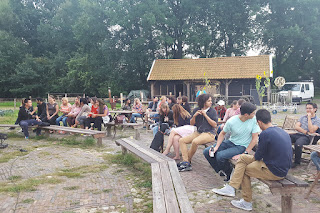How to learn Dutch without leaving your house
I started to learn Dutch a bit over a year ago, when I decided I wanted to live in the Netherlands. I was living in Australia at the time. With all the other languages I've tried to learn over the years (Russian, French, English, Spanish) I used conventional methods - books, dictionary and language instructors. When researching options for learning Dutch in Australia I quickly realized it wasn't going to be as easy as learning more popular languages like Spanish. There simply aren't many Dutch courses or tutors in Sydney. Those that I found very really expensive and offered classes at the most inconvenient times and locations.
I knew about Dutch Summer School, but I was 20.000km away and wasn't able to attend it back then. I had a small baby, busy job and thousand other things to attend to. So I started digging, trying to work out how to learn Dutch in a way that's convenient to me. Over the months I have found lots of very useful tools, which I'd like to share with you.
I had a very simple criteria when choosing tools for learning Dutch - it had to be cheap (or even better - free) and it had to be accessible via internet, so that I could learn from home, at times convenient to me. I found lots and lots of tools, websites and course and tried most of them. Some turned out to be a total waste of time. Others proved to be fantastic. Below is the list of the tools I ended up enjoying and using over and over again:
- Duolingo
- Memrise
Memrise is a flashcard app, perfect for learning vocabulary. You can use one of the courses already available on Memrise, or create your own. There are quite a few Dutch courses available there. The one I found most useful is called "Duolingo Dutch for English Speakers". It's a course, created by someone - no idea who - which contains all the vocabulary from Duolingo Dutch course. Perfect, right! So I decided to combine the two and my system looked like that - I'd use Memrise to learn vocabulary for a specific topic and then, once I knew it, I'd do the corresponding Duolingo lessons. That way, I didn't have to check the vocabulary when doing Duolingo, as I already knew it, and the learning process was becoming much more efficient. As I started learning Dutch with a teacher (see Italki below), I also used Memrise to keep track of vocabulary I learnt that way.
- 1000 Most Common Words in Dutch
I came across learndutch.org very early in my quest to master Dutch. The 1000 Most Common Words in Dutch was the first course from that website that I used. I bought the app that accompanies the course and tried to complete each lesson every few days. I liked the fact that each lesson came with a video, which made memorizing so much easier.
- #dutchgrammar
The grammar instructions withing Duolingo course quickly stopped being sufficient, so I searched for a good source of grammar instructions. I bought a grammar book, but that was boring as hell. So I decided to buy #dutchgrammar. It seemed a bit expensive, but I had a good experience with the 1000 Words course, so I decided to take the risk. It was a wise purchase. As all the participants of the Dutch Summer School can attest, the course is really good. The videos are not too long and the grammar is explained in a way that can be easily understood by anyone, and I mean - ANYONE.
- Italki
As I was progressing with Duolingo, Memrise and #dutchgrammar, I was getting more and more itchy to start speaking Dutch. All those tools are great for learning grammar and vocabulary, but they don't teach you the most important language skill - speaking. So I search for a private tutor in Sydney but their fees were too high for me and they weren't too flexible with their schedule. And then I came across a website called Italki. It's a website where you can find online tutors for pretty much any language you can think off. The website is a connector between teachers and students. You buy credits via the website and then use it to buy lessons from teachers. Most teachers offer trial lessons (often for free), so you can try a few different teachers before committing. The convenience of this system is incredible. I was able to have my classes late in the evening, after my daughter was asleep. There was no time wasted on commuting to a language class or a tutor. There was no drama if for some reason I couldn't make my class - I would simply reschedule. Not to mention it's way way way cheaper than conventional one-on-one language learning. I use Italki to this day.
I've been using all those tools to this day and they are the reason I can now be at the Dutch Summer School and study at the A1+ level. Yes, I could have learnt more in that year and a half, but considering my busy schedule and the fact that I did it all without living my house and never stepping a foot on a Dutch soil, I think I've done quite well.



Komentarze
Prześlij komentarz